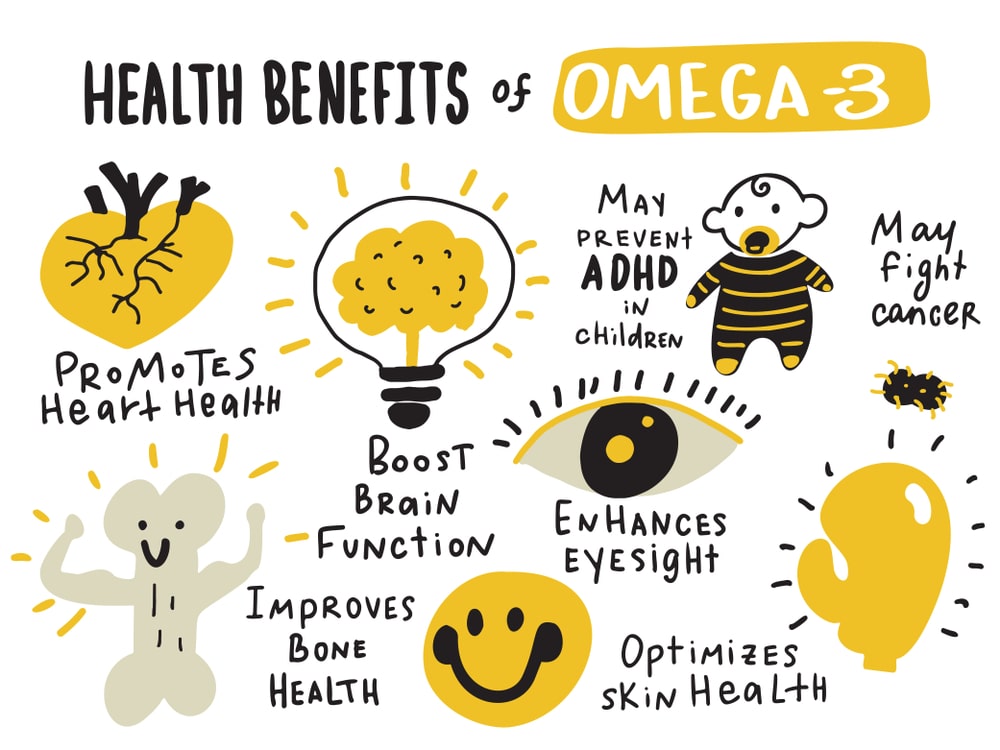Omega-3 Fatty Acids are essential for the overall development of our body and the functioning of our brain. They found in abundance in the superfoods such as walnuts, seeds, chicken, mutton, seafood, fatty fish, and plant oils. The omega-3 fatty acids divided into three categories, and these are alpha-linolenic acid (ALA), acid (EPA), and docosahexaenoic acid (DHA).
The main known Benefits of Omega 3 In Our Body are as follows:
1) It helps to fight depressions and copes with your mental health.
2) It reduces inflammation in your body.
3) Keeps you away from health diseases.
4) Manages your body’s blood pressure.
5) Enhances your brain functioning.
Above are the known Facts Of Omega-3 Fatty Acids For the Body; however, there are a few unknown facts about these fatty acids which are essentially suitable for you to learn, and they are a good source for healthy and shiny hair and skin. Let’s discuss six scientifically proven benefits to consume fish and other Products Rich in Omega-3 fatty Acids for Healthier Skin and Hair.
Protects your hair and skin from Ultraviolet rays
Omega-3 fatty acids help guard you against the sun’s damaging ultraviolet rays, which can be damaging for your skin and hair. Omega-3 fatty acids contain DHA and EPA, and these supplements help reduce the sensitivity to Ultraviolet rays. They protect your skin and hair from the destructive effects of these rays. A few studies prove that people who have a high intake of Omega-3 Fatty acids and frequently go in the sunlight have better skin and hair compared to people who do not consume food products that are rich in Omega-3 and Fish, and other non-vegetarian products. Omega-3 has an excellent quality that enhances your skin’s tolerance and prevents it from sunburns, rashes, itchy skin. It also makes your hair shinier and healthier.
Reduces Acne and itchy scalp
Acnes are the biggest problems for your skin and hair; the itchy scalp the fatty acids can help you fight from these acnes and itchy scalp, making your hair and skin healthy and before. Many professionals prefer omega-3 fatty acids who have hair and skin problems. They ask to take supplements rich in Omega-3 fatty acids and eat food products like walnuts, fatty fish, seafood, chicken, mutton, eggs, seeds, etc., to improve their hair and skin. The Omega-3 would strengthen your hair and skin. It recommends keeping omega-3 incorporated in your diet regularly to enjoy its standard benefits.
Healthy and Shiny Skin and hair
Omega-3 keeps your skin moisturized, fights itchy and red skin, and slows down ageing by keeping your skin and hair healthy and fighting diseases like fungal infection, dermatitis, and psoriasis. A key to getting fit and shinier skin is to eat a lot of Omega-3 fatty acids and make food products like Fresh Fish, meat products, Fresh chicken, walnuts, etc. a part of your life and eating habits, and these products can be so beneficial for not only your hair and skin but also for the overall health of your body and brain. Omega-3 is suitable for pregnant mothers and helps keep their babies healthy and away from any skin disease. It also plays a vital role in hydration and hydrates your body, giving you glowing skin and shinier hair. It will always keep you away from any medical issues related to skin and hair.
Additional benefit of Omega-3 for hair and skin
a) Omega-3 Fatty acid stimulates wound healing in your body.
b) Omega-3 fatty acids have medicinal properties and reduce skin cancer risk and other cancers in the body and keep you far from many life-threatening diseases.
c) These fatty acids also promote hair growth and reduces hair loss and other hair-related issues. It keeps your hair healthier and shinier and keeps you away from hair-related matters.
From the above information, we know that Omega-3 fatty acids are essential for our body and brain functioning, but it also crucial for healthy, beautiful skin and long and shinier hair, and all you need to do this to keep a check on your food intake and consume foods that are rich in Omega-3 fatty acids. You can also take some supplements after consulting your healthcare practitioner.
























